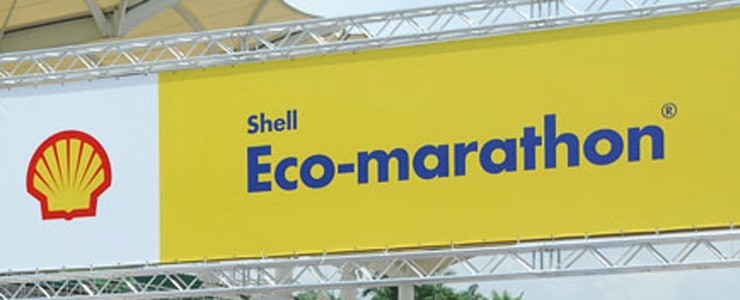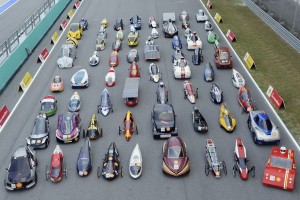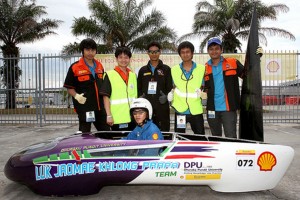Kuala Lumpur hosts Shell Eco Marathon for third time this week
05 Jul 2012|2,740 views
 Students from all over Asia and the Middle East have come together at Sepang International Circuit, Kuala Lumpur to compete in the Shell Eco-marathon Asia 2012. A total of 119 student teams have registered and built vehicles from scratch to compete for the most fuel-efficient vehicle title in this region.
Students from all over Asia and the Middle East have come together at Sepang International Circuit, Kuala Lumpur to compete in the Shell Eco-marathon Asia 2012. A total of 119 student teams have registered and built vehicles from scratch to compete for the most fuel-efficient vehicle title in this region.  Featuring teams from universities, colleges and technical institutes across 18 countries, a similar event has been running in Europe since 1985 and the Americas since 2007 before making its Asian debut in 2010. Besides hosting the event for the third time, Malaysia is also fielding the largest contingent this year with 28 teams with five new countries taking up the challenge this year: Lebanon, Qatar, United Arab Emirates, Hong Kong and South Korea.
Featuring teams from universities, colleges and technical institutes across 18 countries, a similar event has been running in Europe since 1985 and the Americas since 2007 before making its Asian debut in 2010. Besides hosting the event for the third time, Malaysia is also fielding the largest contingent this year with 28 teams with five new countries taking up the challenge this year: Lebanon, Qatar, United Arab Emirates, Hong Kong and South Korea. “It is inspiring to see so many Asian youths coming together to take part in Shell Eco-marathon. These students will finally, in the coming few days, be able to test their vehicles and their innovations, which they have been working on for months, on the track. Shell Eco-marathon is more than just a student race or competition. It is about putting ideas into reality and by giving them this platform, we hope these students will be further encouraged to find creative and smarter mobility solutions to meet the world’s energy challenge today,” says Mavis Kuek, General Manager, Shell Eco-marathon Asia.
 Student teams will participate in either or both the Prototype and UrbanConcept categories. This year, a total of 81 Prototypes and 38 UrbanConcept vehicles are featured from the region. The Prototype category asks teams to enter vehicles that maximises fuel-efficiency through design. The UrbanConcept category focuses on fuel-efficient vehicles that are more production ready.
Student teams will participate in either or both the Prototype and UrbanConcept categories. This year, a total of 81 Prototypes and 38 UrbanConcept vehicles are featured from the region. The Prototype category asks teams to enter vehicles that maximises fuel-efficiency through design. The UrbanConcept category focuses on fuel-efficient vehicles that are more production ready. Awards go to the teams that drove farthest either on 1kW or a litre of fuel. Creativity, safety, design and marketing of vehicles are also taken into account. For both categories, teams may enter vehicles using any of the following energy types: hydrogen (fuel cell), solar, battery electric, gasoline, diesel, Shell Gas to Liquids (GTL), Fatty acid methyl ester (FAME) and Ethanol E100.
28 awards with a total prize money of USD$42,000 (S$53,216) are at stake with the top prize of USD$2,000 (S$ 2,534) to be awarded to the winner of each energy type. New awards like “Eco-Design,” “Best Team Spirit” and “Perseverance in the Face of Adversity” are introduced this year.
Students from all over Asia and the Middle East have come together at Sepang International Circuit, Kuala Lumpur to compete in the Shell Eco-marathon Asia 2012. A total of 119 student teams have registered and built vehicles from scratch to compete for the most fuel-efficient vehicle title in this region.
Featuring teams from universities, colleges and technical institutes across 18 countries, a similar event has been running in Europe since 1985 and the Americas since 2007 before making its Asian debut in 2010. Besides hosting the event for the third time, Malaysia is also fielding the largest contingent this year with 28 teams with five new countries taking up the challenge this year: Lebanon, Qatar, United Arab Emirates, Hong Kong and South Korea.
“It is inspiring to see so many Asian youths coming together to take part in Shell Eco-marathon. These students will finally, in the coming few days, be able to test their vehicles and their innovations, which they have been working on for months, on the track. Shell Eco-marathon is more than just a student race or competition. It is about putting ideas into reality and by giving them this platform, we hope these students will be further encouraged to find creative and smarter mobility solutions to meet the world’s energy challenge today,” says Mavis Kuek, General Manager, Shell Eco-marathon Asia.
Student teams will participate in either or both the Prototype and UrbanConcept categories. This year, a total of 81 Prototypes and 38 UrbanConcept vehicles are featured from the region. The Prototype category asks teams to enter vehicles that maximises fuel-efficiency through design. The UrbanConcept category focuses on fuel-efficient vehicles that are more production ready.
Awards go to the teams that drove farthest either on 1kW or a litre of fuel. Creativity, safety, design and marketing of vehicles are also taken into account. For both categories, teams may enter vehicles using any of the following energy types: hydrogen (fuel cell), solar, battery electric, gasoline, diesel, Shell Gas to Liquids (GTL), Fatty acid methyl ester (FAME) and Ethanol E100.
28 awards with a total prize money of USD$42,000 (S$53,216) are at stake with the top prize of USD$2,000 (S$ 2,534) to be awarded to the winner of each energy type. New awards like “Eco-Design,” “Best Team Spirit” and “Perseverance in the Face of Adversity” are introduced this year.
Featuring teams from universities, colleges and technical institutes across 18 countries, a similar event has been running in Europe since 1985 and the Americas since 2007 before making its Asian debut in 2010. Besides hosting the event for the third time, Malaysia is also fielding the largest contingent this year with 28 teams with five new countries taking up the challenge this year: Lebanon, Qatar, United Arab Emirates, Hong Kong and South Korea.
“It is inspiring to see so many Asian youths coming together to take part in Shell Eco-marathon. These students will finally, in the coming few days, be able to test their vehicles and their innovations, which they have been working on for months, on the track. Shell Eco-marathon is more than just a student race or competition. It is about putting ideas into reality and by giving them this platform, we hope these students will be further encouraged to find creative and smarter mobility solutions to meet the world’s energy challenge today,” says Mavis Kuek, General Manager, Shell Eco-marathon Asia.
Student teams will participate in either or both the Prototype and UrbanConcept categories. This year, a total of 81 Prototypes and 38 UrbanConcept vehicles are featured from the region. The Prototype category asks teams to enter vehicles that maximises fuel-efficiency through design. The UrbanConcept category focuses on fuel-efficient vehicles that are more production ready.
Awards go to the teams that drove farthest either on 1kW or a litre of fuel. Creativity, safety, design and marketing of vehicles are also taken into account. For both categories, teams may enter vehicles using any of the following energy types: hydrogen (fuel cell), solar, battery electric, gasoline, diesel, Shell Gas to Liquids (GTL), Fatty acid methyl ester (FAME) and Ethanol E100.
28 awards with a total prize money of USD$42,000 (S$53,216) are at stake with the top prize of USD$2,000 (S$ 2,534) to be awarded to the winner of each energy type. New awards like “Eco-Design,” “Best Team Spirit” and “Perseverance in the Face of Adversity” are introduced this year.
Latest COE Prices
December 2025 | 1st BIDDING
NEXT TENDER: 17 Dec 2025
CAT A$105,413
CAT B$123,900
CAT C$76,501
CAT E$123,000
View Full Results Thank You For Your Subscription.























